#mr. elton
Note
How do you think Mr and Mrs Elton's future looks like beyond the novel?
I think they'll get along great, they are so well suited to each other! Mr. Elton wants to seem important and Mrs. Elton is all about making herself seem important. Really, they lucked out given that they barely knew each other before they married.

I can see the whole "I'm the bride" thing happening all over again when Mrs. Elton has a baby. Mrs. Elton's baby will be the best baby, better than little Anna Weston and Emma's baby. She'll have more white lace on her baby bonnet than the rest of them! She'll be so well trimmed despite Mrs. Elton having a horror of over-trimmed babies! She'll swallow one of her mother-of-pearl buttons and Mrs. Elton will freak out until it passes...
So basically, they'll be insufferable together. Awwww
61 notes
·
View notes
Text
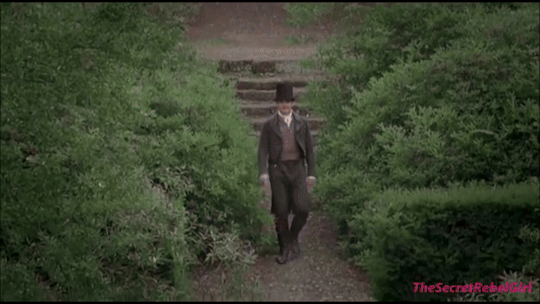
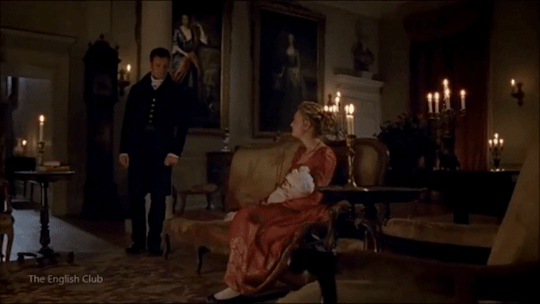

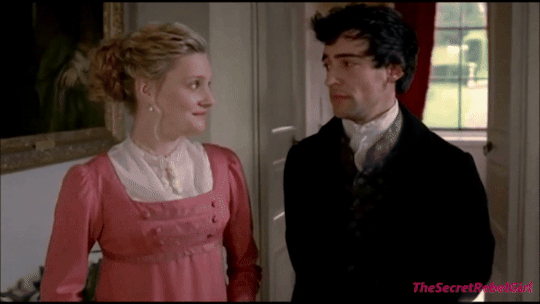
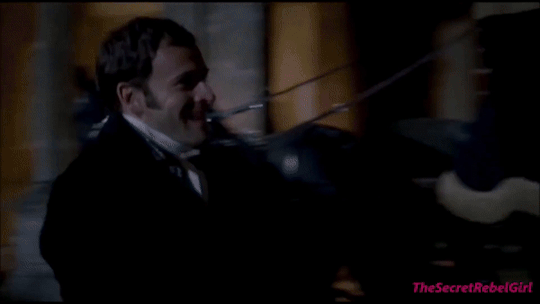

@monthly-challenge 2024 | Day #7: Pink
#i dunno man i just love this miniseries#emma (2009)#emma 2009#emma#springfling2024#my gifs#emma woodhouse#mr. knightley#mr. elton#jane austen
12 notes
·
View notes
Text
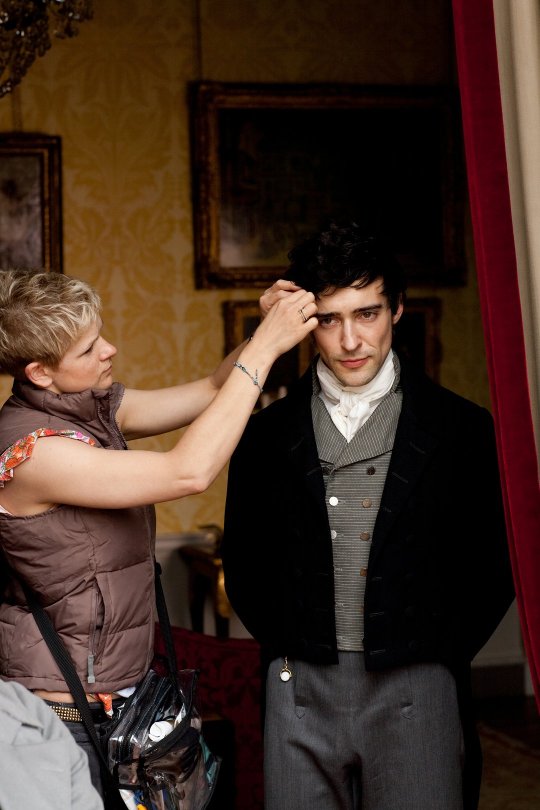


Blake Ritson as Mr. Elton & Christina Cole as Mrs. Elton in Emma (2009)
15 notes
·
View notes
Text

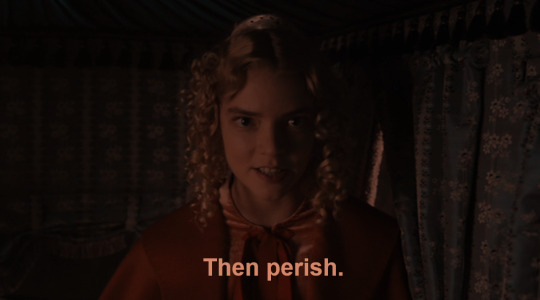
2 notes
·
View notes
Text
Friday, 24th June (Midsummer): An exploring party to Box Hill
Read the post and comment on WordPress
Read: Vol. 3, chs. 7–8 [43–44]; pp. 240–247 (“They had a very fine day” to “equal, kindly intercourse”).
Context
The Westons, the Woodhouses, the Eltons, Harriet Smith, Jane Fairfax, and Frank Churchill travel to Box Hill. Emma and Frank Churchill flirt. Emma levels an insult. Mr. Knightley scolds. Frank Churchill returns to Richmond in the evening.
We know that this occurs a day after the Donwell Abbey party at “almost Midsummer” (vol. 3, ch. 6 [42]; p. 234), “not [...] above six-and-thirty hours” (vol. 3, ch. 9 [45]; p. 254) before Frank’s return to Richmond on “the 26th” (vol. 3, ch. 14 [50]; p. 289).
The party at Box Hill is the eighth and last “major scene” in the novel per Marcia Folsom (2004, p. xxxi).
Note that the sections “The Insult” and "The Remonstrance" contain spoilers.
Readings and Interpretations
The Great Outdoors
The outing to Box Hill closely follows the strawberry-gathering party at Donwell in time and in emotion; indeed the two scenes are often analyzed as a pair. For Margaret Doody, “a scene of near fulfillment and frustration among the red berries brings on the storm of sexual frustration and anger on Box Hill” (p. 348).
Doody notes that, in light of the fictional nature of “Highbury,” “[t]he important scene on Box Hill in Emma represents an unusual use by Austen of a real and specific outdoor site. In a most interesting departure the action moves away from the settlements (Saxon and Norman) so strongly insisted on elsewhere in the novel. We enter a kind of no-man’s-land, not quite civilization. The expedition transports everyone to a pocket of time as well as an alternative space” (p. 346).
Many critics note that the unusually far abroad setting of Box Hill coincides with a lack of moral or social cohesion. Samuel Burchell, for example, writes that physical space becomes a metaphor for isolation in the description of the outing:
Emma, alone in her selfish and thoughtless existence, is involved in one misunderstanding after another […]. In many ways the picnic at Box Hill becomes the symbol for this tissue of misunderstandings. At the start of the day the appearance of everything was splendid: “They had a very fine day for Box Hill; and all the other outward circumstances of arrangement, accommodation, and punctuality, were in favour of a pleasant party.” But reality—misunderstanding—appears as the people make their way onto the scene: “There was a languor, a want of spirits, a want of union, which could not be got over.” This want of union is more than merely simple misunderstanding of fact; it is the graphic presentation of man’s loneliness. (p. 150)
Burchell argues that, for Jane Austen, this isolation is morally culpable: “misunderstanding and isolation will exist as long as pride, vanity, and weakness exist” (ibid.). Similarly, Alistair Duckworth writes that “the specter of social fragmentation comes closest to actualization” on Box Hill:
On Box Hill, where, as one eighteenth century description has it, the mazes make it “very easy for amorous couples to lose and divert themselves unseen,” a “principle of separation” [p. 240] divides the company into separate groups. There is a “want of union” [ibid.] which the indiscriminately benevolent Mr. Weston is quite incapable of harmonizing: “The Eltons walked together; Mr. Knightley charge of Miss Bates and Jane; and Emma and Harriet belonged to Frank Churchill” [ibid.]. […] [H]ow greatly is the separation to be deplored, and how appropriately does Jane Austen distinguish between the selfishness of the Eltons, the social stewardship of Knightley—he at least is concerned about the fate of single women in society—and the continued and misguided collusion of Emma and Churchill, with Harriet, as usual, in tow. What follows on the hill is an emblem of a vitiated society where selfishness is uncurbed and no publicly accepted rules of behavior permit free and “open” communication. (pp. 176–7)1
Hating Miss Bates
Throughout the novel, Emma has a particular horror of Miss Bates. David Minter writes that “Emma stands in sharp contrast to her world” on this point, given that “the striking thing about Miss Bates is that everyone tolerates her with more grace than Emma, including people more than equally vain, self-indulgent, and callous” (p. 53):
Far from being a matter of one hasty insult, the problem is of long-standing. Emma has always been “rather negligent” in her conduct to Miss Bates [vol. 2, ch. 1 [19]; p. 99]; in fact, she simply finds Miss Bates “too good natured and too silly” (p. 65). But what is here meant by “good natured”; and how does it differ from the qualities Emma consistently admires in the members of her family […]? The distinctive form Miss Bates’s good nature takes can, I think, be defined; and it is closely related to the particular form her self-indulgence takes. Complacent and uncritical, Miss Bates simply refuses to be demanding either of self or of life. From first to last she stands as an embodiment of implicit refusal to demand that self and life compel abundance and style to cohere. From Emma’s point of view, Miss Bates is too good natured precisely because she is content to be, like her speech, an undifferentiated “incessant flow” through which is “lost” the peculiar richness Emma deems most worth cherishing. (pp. 53-4)
John Wiltshire similarly notes Emma’s tolerance of others, and others’ tolerance of Miss Bates, and asks “[w]hat then is it about Miss Bates that gets under Emma’s skin?” He answers:
Miss Bates’s frequent effusions of gratitude are so intrinsic a part of her social presence—‘You are very kind’; ‘so very obliging’; ‘such a very kind attention’ etc.—that they obviously contribute to Emma’s irritation and antagonism. […] The iteration of ‘so very obliging’ is a constant reminder that, as Knightley is to put it later, Miss Bates has ‘sunk from the comforts she was born to’; a reminder of social inequality, and thus, as Emma must instinctively recognise, of the obligation to oblige. Thus Miss Bates, unconsciously and as it were helplessly, exacts her due from that social contract which has so much to do with the kindness that is Emma’s conceptual nexus. (p. 112–3)
The Insult
Emma insults Miss Bates on Box Hill in a moment that the “interpretive history of Emma repeatedly records […] as ‘the emotional climax of the novel’” (Rosmarin, p. 332): As John Wiltshire writres, “[y]ou brace yourself for this moment, however many times you have read Emma, and when it comes it is still ghastly. ‘Ah! Ma’am, but there may be a difficulty. Pardon me—but you will be limited as to number—only three at once’” (p. 115).
Emma’s especial dislike of Miss Bates, and the awkwardness, discomfort, and disappointment of the much-looked-forward-to outing, perhaps combine to produce the conditions for her insult. Wiltshire, amongst other critics, notes the strained circumstances of the day:
If at Donwell, Emma is at ease, the opposite is true of her mood at the picnic. Here she is the victim of the tensions running though the ill-sorted group that Mr Weston has assembled. (He’s assumed that Emma won’t mind Mrs Elton’s being in the party, and that Mrs Elton won’t mind Emma’s; he doesn’t realise that Knightley and Elton are on awkward terms, and he certainly doesn’t know that Frank and Jane have had an altercation the previous afternoon.) Churchill, tense and cross, pretends to be light-hearted, forcing Emma to flirt (she might consider how she’s wounding Harriet: he is knowingly wounding Jane). (p. 114)
Similarly, per David Minter:
Both Frank Churchill’s role and Emma's response to deficiency, to languor, to disunity, and to dullness are central throughout the Box Hill outing; in particular, they are essential to appreciation of Emma’s rudeness to Miss Bates […]. For one implication of the extreme demands Emma makes of life is precisely that she is dangerous—is a threat both to herself and to others—when she is disappointed. This and frustrated and bored […]. Both in this episode and elsewhere, Emma’s extreme demands [for variety and excitement life cannot supply] turn on her to lower rather than exalt her and to injure rather than benefit those around her. (pp. 52–3)2
Emma, therefore, is unable to “resist” uttering her unkind witticism. Per Wiltshire, it is “the ‘mock ceremony’ of Emma’s manner [that] gives her insult its wounding edge”:
What is so confronting about this moment is not just that it exposes the underbelly of Emma’s feelings about Miss Bates—the antagonism and irritation that, as the novel has hinted, runs very deep. It is a shameful betrayal of her own kindness, and, as Mr Knightley soon tells Emma, it is cruel. What makes it so much worse is that because one likes Emma, is committed to her, one instantly feels the shamefulness with her. (p. 115)
In keeping with an interpretation of Austen in which everyday matters have monumental moral significance, dire readings of Emma’s insult predominate. Alistair Duckworth, for example, writes:
[W]hat Emma does when she so flagrantly insults Miss Bates is to violate a social contract; spurred on by Churchill, she forgets her social obligation (or proper role) and adopts the role of an ironic and theatrical wit. After the insult, and a short-lived attempt to play a conundrum game (the last game of the novel), the group erupts into barely concealed hostility (between Mrs. Elton and Emma, between Elton and Churchill, between Churchill and Jane), and were it not for Knightley’s fidelity to his social duty and Emma’s ability soon after to realize the “evil” of her words and wit and truly to repent of them, the ultimate social vision of the novel would be bleak. (p. 177)
Similarly, Mary-Elisabeth Tobin argues that “Emma’s insults and slights at Box Hill have enormous political significance”: “In neglecting her duty as a member of the gentry to care for those members of her society who are less fortunate than she, Emma has clearly violated the rules of an intricate and delicately balanced system of duty and obligation, of benevolence and gratitude. Neglecting her charitable duties is tantamount to severing the ties that bind this society together” (p. 421). Some critics emphasize the personal as well as the social and political stakes: for David Southward, Emma’s behavior amounts to nothing less than a “ruthless humiliation” (p. 769).
In response to this general tendency, Claudia Johnson writes that “[t]he leisurely eddying of Emma’s pace, combined with the insistent ordinariness […] of so much of its material, makes strident moralizing sound a bit strained. As a result, the identification and assessment of the faults which are supposed to make [Emma’s] humiliation and reform necessary have a hyperbolic ring to them” (pp. 127–8). She allows that “Emma transgresses in much the same way [as Mrs. Elton] when she mocks Miss Bates at Box Hill”; however, “shameful” as this insult may be, it “stand[s] out precisely because” “infractions” of its kind on Emma’s part are “infrequent” (pp. 129–30). Johnson also notes Emma’s charity to the Bateses (p. 128): indeed, Tobin’s charge that Emma’s conduct towards Miss Bates has before this been characterized by “neglect” stands against Emma’s later reflection that she had been “remiss, perhaps, more in thought than fact” (vol. 3, ch. 8 [44]; p. 247).
Jenny Davidson, for her part, expresses uncertainty as to “to what extent we would condemn this moment ourselves, as readers, or find Emma deeply morally culpable for what is partly just an inability to resist showing off her own verbal ingenuity,” were it not for the fact that “the novel stages a significant reproach for her in the form of Mr. Knightley’s most severe reproof” (p. 72).
M and A.
Immediately after Emma’s mockery, “Frank’s father […] tries to break the silence caused by Emma’s cruel witticism by producing an ‘indifferent piece of wit’ of his own” (Knoepflmacher, p. 652). U. C. Knoepflmacher writes:
Amply demonstrating his indifference to Emma’s gravest imperfection in the book, Mr. Weston asserts the “two letters of the alphabet” best expressing “perfection” to be “M. and A.—Em—ma” (III, ch. 7, [243]). His gallantry, as inopportune as it is inappropriate, only helps to sharpen our sense of Emma’s fault. But Mr. Weston’s incongruous praise also applies to an imperfection less applicable to Emma than to his own son: the disparity that may exist between the empty professions of a sentiment and an actual truth of feeling. (ibid.)
Critics take this conundrum (as Duckworth noted, the last in a string of games in the novel) as representative of various things. For Cecily Devereux, the joke demonstrates “the narrative’s concern with the slippery nature of words, and the ease with which they may be misunderstood” (p. 43). Joseph Litvak writes that the disaggregated “characters” of Emma’s name remind us that “character need not be a homogeneous entity, that it is an aggregate of many different characters, that the self is no more a fixed identity than the name, a construct susceptible to fragmentation and rearrangement” (p. 770). Thus Knightley’s “characteristic moral seriousness” in objecting to the descriptor of “perfection” (since “[t]wo letters have been left out of Emma’s name, and Knightley wishes to see Emma’s character made whole”) does not succeed in tamping out what there is to “enjoy[]” in the “badness of the pun” (ibid.).
Mark Loveridge writes that “there is another reason (one which is probably over Mr. Weston’s head) why M and A should add up to perfection”; he speculates that the conundrum may be a reference to Francis Hutcheson’s Enquiry into the Original of our Ideas of Beauty and Virtue (1725), in which “M” represents “Moment of Good” and “A” a moral agent’s “Ability”. Thus:
Benevolence, or Virtue in any Agent, is as M/A, or (M + 1)/A, and no Being can act above his natural Ability; that must be the Perfection of Virtue where M = A, or when the Being acts to the utmost of his power for the publick Good; and hence the Perfection of Virtue in this case, or M/A, is as Unity. (Hutcheson, volume II, section iii, p. 172; qtd. in Loveridge, p. 215)
This and the other occasional reference to the Moral Sense writers in Emma evidence a “habit or method of filling the novel with small jokes and party games to do with words and phrases”: this one, in particular, is likely a joke “made for the author and the reader (or those readers in the know) to share, at the expense of the characters” (p. 215). Jillian Heydt-Stevenson writes of this joke that, “unknowingly, Mr Weston identifies what is missing from Emma’s character as well as from almost every member of the Box Hill party: each ‘agent’ acts for his or her own interests rather than for the […] ‘publick Good’ (p. 157).
The Remonstrance
Mr. Knightley famously chides Emma for the insult she levels at Miss Bates: “‘I cannot see you acting wrong, without a remonstrance. How could you be so unfeeling to Miss Bates? How could you be so insolent in your wit to a woman of her character, age, and situation?’” (p. 245). (Of course Miss Bates, as a woman, had not received “an education that would enable [her] to earn [her] livelihood”—she is one of those “women of the middle and lower upper classes who without fortune and independence either lived in genteel poverty or worked as governesses or teachers” (Tobin, p. 415).)
Critics tend to read Knightley’s remonstrance as unbiased and morally righteous. Lynch Hall writes that Knightley “brings Emma (and the reader) to realize that she must tolerate the ridiculous, and that Miss Bates’s ‘situation should secure [her] compassion’ [p. 246]. Mr. Knightley’s disinterested charity and chivalry, then, is brought forward by Miss Bates’s limitations; he is solidified as the hero and is revealed as worthy of the heroine’s hand” (p. 173). David Medalie likewise sees Knightley’s chiding as arising from the immediate circumstance of Emma’s insult, contextualizing it within the social and economic system of Austen’s day:
In many ways, Mr Knightley’s scolding of Emma comes as a surprise—not that he reprimands her, but the way in which he does so. One might have thought that he would deprecate discourtesy in general, insisting that Miss Bates is as entitled as anyone to that due measure of courtesy which is the right of everyone in a civilised society. But that is not what he does. Instead, he bases his criticism on a very specific assessment of the two women’s respective positions in society. […] [H]ere he seems to be taking his insistence on always seeing people in terms of birth, class and money to extraordinary lengths, with the rather startling suggestion that he might even have been willing to overlook Emma’s conduct if Miss Bates enjoyed the same social and economic status […]. What appears to be a form of tendentious morality in him shows instead an understanding of the vulnerability of those disempowered through penury or lack of social status, and the extent to which such people cannot defend themselves against someone like Emma. (p. 6)3
Michele Larrow, who argues that “[a]s Mr. Knightley becomes more aware of his love for Emma, he uses his sympathetic imagination better,” differs from this tone of unmitigated praise. She views this incident as an intermediary step in Knightley’s learning sympathy:
In Mr. Knightley’s remonstrance of Emma’s insult to Miss Bates at Box Hill, he again assumes the role of judge and seems oblivious to the pain his comments will cause Emma. His words are harsh, yet they echo Adam Smith’s view that one has to consider the situation of others to understand their feelings: “‘How could you be so unfeeling to Miss Bates? How could you be so insolent in your wit to a woman of her character, age, and situation?’” When he tells her, “‘It was badly done, indeed! . . . to have you now, in thoughtless spirits, and the pride of the moment, laugh at her, humble her,’” his moral censure is almost overpowering. (n.p.)
Larrow also reminds us that, at this point, Knightley fears that he has lost Emma to Frank. In light of this fact, we can consider that he is trying to issue one last corrective lesson before he resigns Emma to Frank’s bad influence (thus “I will tell you truths while I can,” p. 246, emphasis mine); or else, that his vociferousness is partly fueled by the jealousy induced by watching the two young people flirt all afternoon.4
The Remorse
A conventional reading of Emma views it as containing cycles that are repeated, but with a difference: Emma goes through several iterations of mistake and remorse that ultimately leave her morally improved. For Marcia Folsom, the aftermath of Box Hill marks Emma’s “second great epiphany” (p. 49):
She actually experiences the loss of self-esteem implied in the word “mortified”: “Never had she felt so agitated, mortified, grieved, at any circumstance in her life.” Emma’s habit of expressing herself in triads is here compressed, and this compression makes the blow palpable: “She was most forcibly struck.” In a surprisingly clinical word for Emma’s mood, the narrator says, “She never had been so depressed.” Unlike her buoyant return to her mind’s youthful cheerfulness the morning after Mr. Elton’s proposal, this time, “Time did not compose her” [vol. 3, ch. 7 [43]; p. 246], and she is “just as determined when the morrow came” to fulfill her resolution as she was in her night of remorse [vol. 3, ch. 8 [44]; p. 247]. The difference between these two nights of painful self-criticism suggests she has actually changed and is now more capable of truthful self-examination. (2016, p. 50)
Davidson questions the idea that Emma’s complete moral reform has resulted from this incident:
The skeptical reader may note that it is the fact of Mr. Knightley’s thinking badly of her, rather than deep remorse about the cruelty of her words to Miss Bates, that seems to be emphasized by the language here [“The truth of his representation there was no denying”], and many readers have felt about Emma that the novel’s drama of correction and submission is undermined or at least ironized by the fact that Emma is the stronger personality of the two and has no good reason to reform herself permanently. I think this ambivalence or uncertainty is embedded in the novel’s very language; at the very least, it’s something that can be argued back and forth nearly endlessly. (pp. 72–3)
I would note, however, that Mr. Knightley has disagreed strongly and even displayed anger in arguments with Emma elsewhere in the novel (about Harriet and Robert Smith, for example, or about the probable merits of the as-yet-absent Frank Churchill) without producing in Emma an immediate conviction of “[t]he truth of his representation.”
Ultimately, the Box Hill scene is an enigmatic one. Michael Gamer writes of the “pleasure [Austen] takes in providing surfaces that point to corresponding depths, only to expose those apparent depths as surfaces that are never fully known or explained”:
Emma’s final chapters may expose the "real" alliances that have driven the episode and that constitute Emma’s ending, but they cannot account for Frank Churchill’s behavior or describe Jane Fairfax’s feelings, let alone explain Emma’s loathing of Jane or her reasons for attacking Miss Bates. Even Knightley's attempt to close the episode by chastizing Emma leaves fundamental questions unanswered, such as whether Emma should support Miss Bates because she has fallen from her former stature (i.e., has become an object of sympathy) or because she remains, however tenuously, of the same class (i.e., is a person whose fall matters). Knightley’s attempt to reduce the episode to class, moreover, occurs at the end of a chapter until then surprisingly free of such awareness; and class analysis, so useful in previous chapters, does not even begin to provide insight into how people behave at Box Hill. It neither answers why the parties divide as they do nor explains why they converse with such strain. […] I find myself, therefore, believing less in the deep interiority of Emma’s characters—an interiority that would defy surface—than in Austen’s belief in a social density that is unsortable, unexplainable, and therefore unanswerable to any discursive formation. (n.p.)
Footnotes
On Box Hill’s association with lovers and sex see Doody (pp. 346–9).
Contrast Susan Morgan, who argues that an essential aspect of Emma is how it demonstrates that the demands of the imagination need not be unfulfilled.
For another formulation of this argument see Tobin.
On Knightley’s remonstrance see also also Babb (pp. 187–8).
Discussion Questions
What makes Emma fail to tolerate Miss Bates despite being able to tolerate her father? What motivates Emma’s insult?
Do you agree that the general critical tone of moral condemnation of Emma’s insult is overweaning, as Johnson suggests?
Should we perform a “humanist” or “transhistorical” reading, “interpret[ing] Emma’s thoughts and actions as a variation of the growing pains endemic to a universal young adulthood” (Tobin, p. 413)? Or is an understanding of “political, social, and economic problems specific to early nineteenth-century Britain” necessary to understand the significance of this episode (ibid.)?
What is the significance (on the level of textual effect, plot, or character) of Mr. Weston’s conundrum?
What motivates Mr. Knightley to reprove Emma? What is the overall tone of his remonstrance?
Does Emma’s remorse stem from her own reflection and moral code, or from Mr. Knightley’s disapproval? What hinges on the answer to this question?
Bibliography
Austen, Jane. Emma (Norton Critical Edition). 3rd ed. Ed. Stephen M. Parrish. New York: W. W. Norton & Company, [1815] 2000.
Burchell, Samuel C. “Jane Austen: The Theme of Isolation.” Nineteenth-Century Fiction 10.2 (September 1955), pp. 146–50. DOI: 10.2307/3044229.
Davidson, Jenny. Reading Jane Austen. Cambridge: Cambridge University Press (2017), pp. 144–8. DOI: 10.1017/9781108367974.
Devereux, Cecily. “‘Much, Much beyond Impropriety’: Ludic Subversions and the Limitations of Decorum in Emma.” Modern Language Studies 25.4 (Autumn 1995), pp. 37–56. DOI: 10.2307/3195487.
Doody, Margaret Anne. Jane Austen’s Names: Riddles, Persons, Places. Chicago: University of Chicago Press (2015).
Folsom, Marcia McClintock, ed. Approaches to Teaching Austen’s ‘Emma’. New York: MLA (2004).
_____. “Emma: Knowing Her Mind.” Persuasions 38 (2016), pp. 41–55.
Gamer, Michael. “Unanswerable Gallantry and Thick-Headed Nonsense: Rereading Box Hill.” Romantic Circles.
Heydt-Stevenson, Jillian. “Games, Riddles and Charades.” In The Cambridge Companion to Emma, ed. Peter Sabor. Cambridge: Cambridge University Press (2015), pp. 150–65. DOI: 10.1017/CBO9781316014226.013.
Johnson, Claudia L. “Emma: ‘Woman, Lovely Woman, Reigns Alone’.” In Jane Austen: Women, Politics, and the Novel. Chicago: University of Chicago Press, 1988, pp. 121–43.
Larrow, Michele. “‘Could He Even Have Seen into Her Heart’: Mr. Knightley’s Development of Sympathy.” Persuasions On-Line 37.1 (Winter 2016).
Litvak, Joseph. “Reading Characters: Self, Society, and Text in Emma.” PMLA 100.5 (October 1985), pp. 763–73. DOI: 10.2307/462096.
Minter, David Lee. “Aesthetic Vision and the World of Emma.” Nineteenth-Century Fiction 21.1 (June 1966), pp. 49–59. DOI: 10.2307/2932698.
Morgan, Susan J. “Emma Woodhouse and the Charms of Imagination.” Studies in the Novel 7.1 (Spring 1975), pp. 33–48.
Rosmarin, Adena. “‘Misreading’ Emma: The Powers and Perfidies of Interpretive History.” ELH 51.2 (Summer 1984), pp. 315–42.
Southward, David. “Jane Austen and the Riches of Embarrassment.” Studies in English Literature, 1500–1900 36.4 (Autumn 1996), pp. 763–84. DOI: 10.2307/450975.
Tobin, Mary-Elisabeth Fowkes. “Aiding Impoverished Gentlewomen: Power and Class in Emma.” Criticism 30.4 (Fall 1988), pp. 413–30.
Wiltshire, John. “The Heroine.” In The Cambridge Companion to Emma, ed. Peter Sabor. Cambridge: Cambridge University Press (2015), pp. 105–19.
#Emma#Jane Austen#Emma Woodhouse#Mr. Knightley#Mr. Elton#Mrs. Elton#Frank Churchill#Mr. Weston#Mrs. Weston#Jane Fairfax#Harriet Smith#e
16 notes
·
View notes
Text

Hello, Mr. Elton... err... Blake Ritson.
0 notes
Text

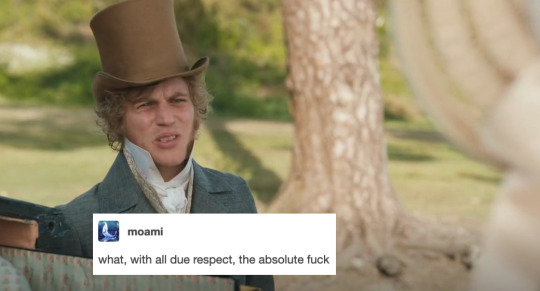
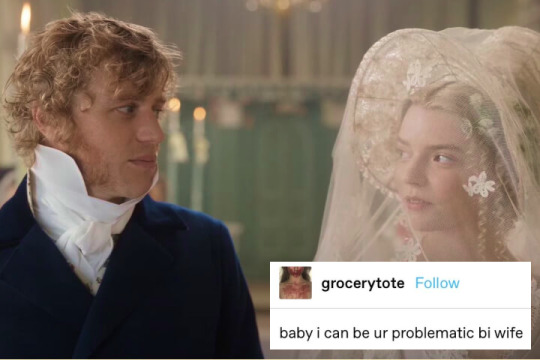
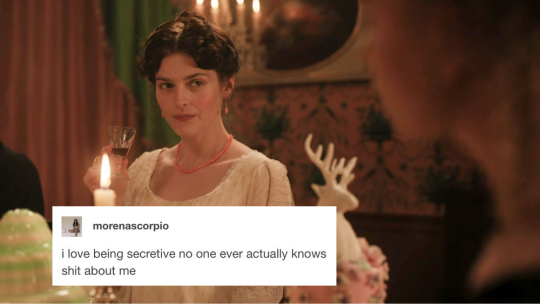
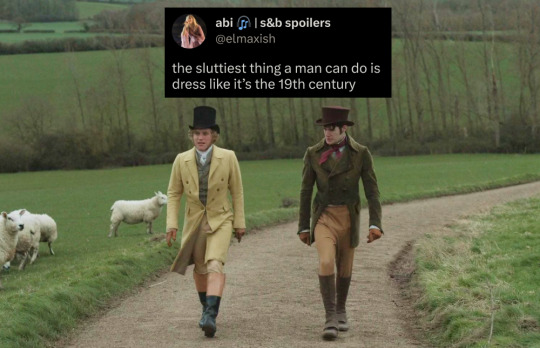


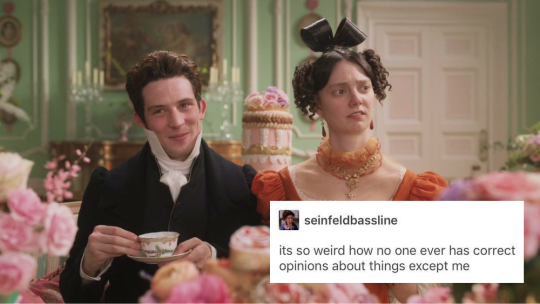
Emma. 2020 text posts
More: Sense and Sensibility 1995 text posts | Northanger Abbey 2007 text posts
#emma memes#emma#jane austen memes#jane austen#english lit memes#emma 2020#text posts#emma woodhouse#mr knightley#jane fairfax#mrs elton#harriet smith#robert martin#anya taylor joy#johnny flynn#my stuff
561 notes
·
View notes
Text

Best book ever written, nothing will ever be funnier than this, Jane Austen I love you more than anyone else in the world <3
#Mr. knightley i love you so much#also Mr. knightley is so in love with Emma#it’s so cute#he can hardly help from smiling even when she’s making fun of him#thank goodness Mrs. Elton was there#I really can’t blame him#she’s like a combination of all my most obnoxious family members#I swear to god if she brings up that god damn barouche-landau again#and mother fucking maple grove#anyway where was i#Jane Austen literary & comedic genius everybody#i love her so muuuuuch#emma#jane austen#books
139 notes
·
View notes
Note
How would Mr Elton's proposal to Emma have seemed to a regency audience? Was he punching far above his weight or would it have been seen as an acceptable match?
So firstly, I believe the joke of Mr. Elton proposing is that both parties judged his status incorrectly. He thinks far too much of himself, she thinks too lowly of him. She may even misjudge his income. I do think he is way off in thinking he can marry her. As Mr. Knightley says:
A man would always wish to give a woman a better home than the one he takes her from (V3, Ch 13)
which is certainly not something Mr. Elton can do for Emma.
Mr. Elton is physically attractive and he is found charming by other women, though Emma actually runs out of the room at one point to laugh because she finds his flirting so over the top. He is trying to trade on his beauty and charm for wealth. We are told he has a small living, some independent property, and his connections are not very good.
Now love matches of great disparity did happen, women similar to Emma marrying 'poor' clergymen. However, I think Emma is generally correct in her assessment of herself. She is from an ancient family and is extremely wealthy. Her fortune is the same as Georgiana Darcy. Mr. Elton was kind of crazy to think that she would marry him. And that might be why we are specifically told that he was a little drunk.
Also, Emma was giving Elton what seemed like a lot of encouragement. She's inviting him over and kind of flirting by proxy for Harriet. Elton takes this as meant to mean that Emma likes him and that is why he proposes. (Knightley ends up doing this by accident as well)
We can compare Mr. Elton to Edmund Bertram (Mansfield Park). While Mary Crawford is not very encouraging to Edmund because she can't decide if she likes him or not, Edmund also seems aware that Mary could do much better than him:
“I cannot intend anything which it must be so completely beyond my power to command. Miss Crawford may chuse her degree of wealth. She has only to fix on her number of thousands a year, and there can be no doubt of their coming. My intentions are only not to be poor.” (Ch 22)
Edmund is also both richer and far better connected than Mr. Elton, though they are both physically attractive. So if Edmund thinks he's not worthy of Mary Crawford with 20k, I doubt people would find Mr. Elton "worthy" of Emma with 30k.
Lastly, a similar proposal happens in Agnes Grey, by Anne Brontë. In that novel, the wealthy Rosalie flirts on purpose with a vain clergyman and he proposes. She rejects him soundly and his vanity is mortified. While Agnes is disgusted by Rosalie for leading him on, she also notes that only a man as vain as him could have thought his proposal would be accepted.
So my feeling, from what is presented in the other novels, is that Regency audiences would find Elton's proposal to be very presumptuous and a display of his inflated vanity.
One last note: Mr. Elton does not notice that Emma is unhappy with him at the Weston's party. This paragraph is very much "man flirting with woman and not picking up her vibes"
Emma’s project of forgetting Mr. Elton for a while made her rather sorry to find, when they had all taken their places, that he was close to her. The difficulty was great of driving his strange insensibility towards Harriet, from her mind, while he not only sat at her elbow, but was continually obtruding his happy countenance on her notice, and solicitously addressing her upon every occasion. Instead of forgetting him, his behaviour was such that she could not avoid the internal suggestion of “Can it really be as my brother imagined? can it be possible for this man to be beginning to transfer his affections from Harriet to me?—Absurd and insufferable!”—Yet he would be so anxious for her being perfectly warm, would be so interested about her father, and so delighted with Mrs. Weston; and at last would begin admiring her drawings with so much zeal and so little knowledge as seemed terribly like a would-be lover, and made it some effort with her to preserve her good manners. For her own sake she could not be rude; and for Harriet’s, in the hope that all would yet turn out right, she was even positively civil; but it was an effort; especially as something was going on amongst the others, in the most overpowering period of Mr. Elton’s nonsense, which she particularly wished to listen to. She heard enough to know that Mr. Weston was giving some information about his son; she heard the words “my son,” and “Frank,” and “my son,” repeated several times over; and, from a few other half-syllables very much suspected that he was announcing an early visit from his son; but before she could quiet Mr. Elton, the subject was so completely past that any reviving question from her would have been awkward.
Mr. Elton needs to review this concept:
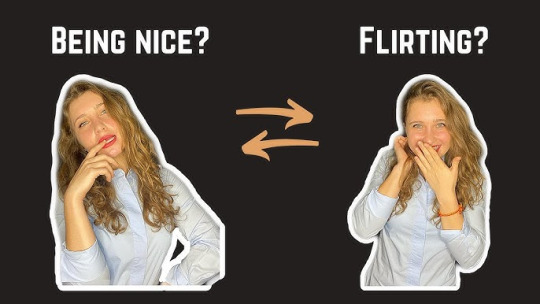
54 notes
·
View notes
Text
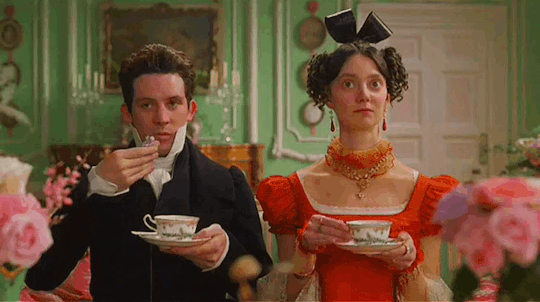
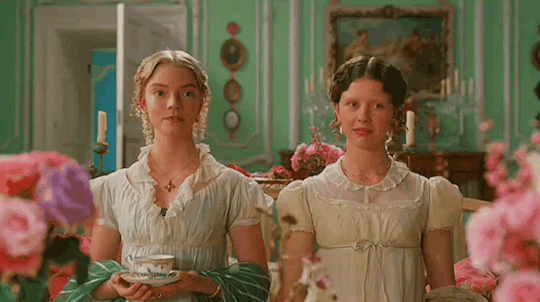

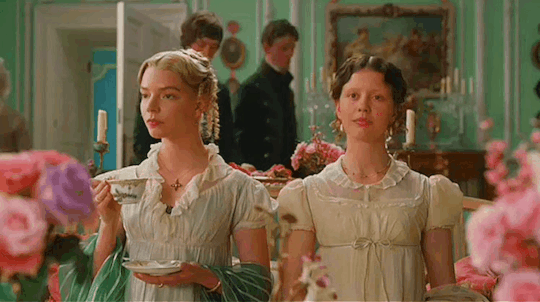
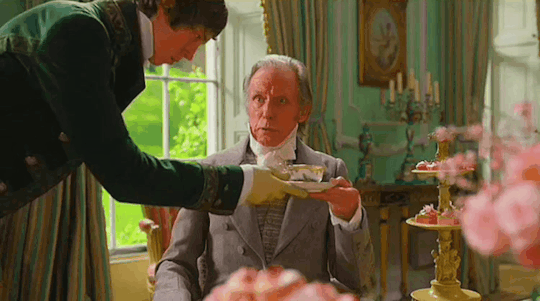

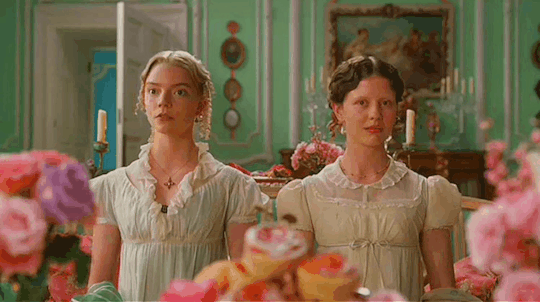
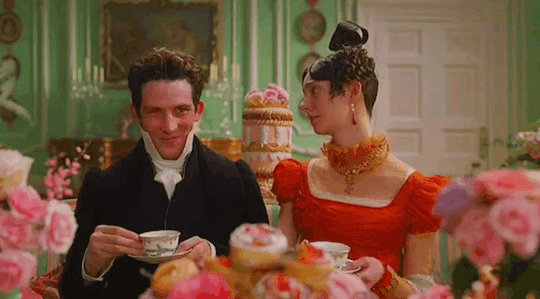
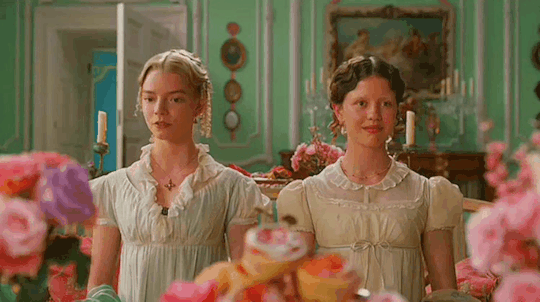
EMMA (2020)
dir. autumn de wilde
#emma 2020#jane austen#costume drama#period drama#perioddramaedit#perioddramagif#long post#emma woodhouse#harriet smith#mr elton#mrs elton#mr woodhouse#anya taylor joy#mia goth#josh o'connor#tanya reynolds#bill nighy#my gifs#mine
75 notes
·
View notes
Text
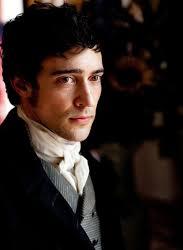
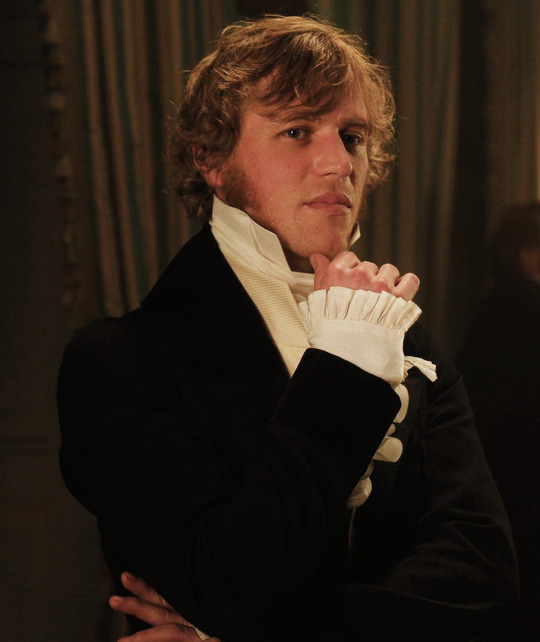
#hotjaneaustenmenpoll#emma#Mr Elton#Mr Knightley#george knightley#Emma 2020#emma 2009#Mr Elton (2009) Vs Mr Knightley (2020)#Johnny Flynn#blake ritson#round one
58 notes
·
View notes
Text
Mr. Elton: I will die if you refuse me
Emma:
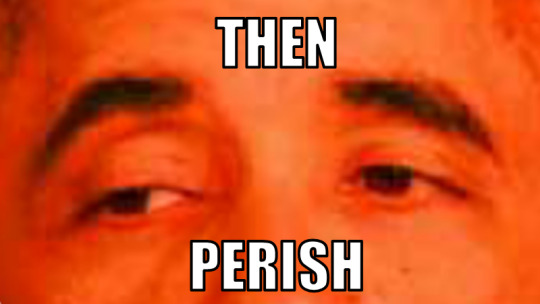
138 notes
·
View notes
Photo


I must avail myself of this precious opportunity to declare sentiments which are already well known, my ardent attachment.
#emma#emma 2020#austenedit#perioddramaedit#josh o'connor#mr elton#weloveperioddrama#userhayf#chewieblog#cinemapix#userstream#userbrit#userthing#usersource#gifhistorical#userperioddrama#usersugar#dailytvfilmgifs#usersansa#userrizz#cinematv#*my gifs
166 notes
·
View notes
Text
12th May (Old May Day Eve): The Crown Inn ball occurs at last
Read the post and comment on WordPress
Read: Vol. 3, ch. 2 [38]; pp. 207–216 (from "No misfortune occurred" to "'no, indeed'").
Context
This date is not definite. Jo Modert writes: “Events between the Crown Inn ball and the first of June show it occurs during the second week in May. No weekday is given, but I suggest Thursday the twelfth (Old May Day Eve) with Harriet’s encounter with the gypsies on Old May Day—Friday the thirteenth” (p. 57).
This occasion is the fifth of eight “major scenes” identified by Marcia Folsom (2004, pp. xxx-xxxi).
Note that this write-up contains spoilers.
Readings and Interpretations
General Benevolence, Specific Friendship
Emma, upon finding out that her reserved role of advance inspector has in fact been reserved for half the company, mentally chides Mr. Weston: “General benevolence, but not general friendship, made a man what he ought to be.—She could fancy such a man” (vol. 3, ch. 2 [38]; p. 208). Critics generally point out that this remark shows Emma to be thinking, perhaps unconsciously, of Mr. Knightley. G. A. Wilkes cites it as evidence that “Mr Knightley [has become] for Emma a standard by which other men are measured,” writing that Mr Knightley seems to be by this point “Emma’s special preserve” (p. 83). Edward Neill similarly writes that “[I]n the light of the playing on the word [“fancy”] which takes place, the text seems to twit Emma here—she has no need to ‘fancy such a man’ because she already has an example to hand in the person of Mr Knightley” (p. 45). J. F. Burrows points out the change in Emma’s thinking which this represents: “This is scarcely the Emma who had allowed Mr. Elton’s agreeableness the advantage over “‘Mr. Knightley’s downright, decided, commanding sort of manner’” [vol. 1, ch. 4; p. 21] or who, on the evening of the snow, had taken as little notice of Mr. Knightley’s thoughtfulness as of Mr. Weston’s heartless sociability” (p. 102).1
Other commenters emphasize this passage’s implications for the novel’s themes over its psychological significance to its protagonist. Eugene Goodheart writes that Emma’s moral “seriousness,” to her credit, is occasionally “reflected in her own autonomous spirit”: “From time to time she does display a capacity for seeing her friends and neighbors with a cool discriminating eye, unaffected by any investment of her own ego. Her judgment of Mr. Weston’s character has the sharpness and the gravity of Austen herself: [Quotes from ‘Emma perceived that and felt’ to ‘She could fancy such a man’]. Austen herself is speaking through Emma” (pp. 592–3).
Sarah Emsley similarly argues that this passage mirrors Austen’s (/ the narrator’s) perspective. She writes that the distinction here drawn between “benevolence” and “friendship” has to do with the novel’s perspective on the virtue of charity:
It is not Emma’s vanity alone that is damaged by being considered “the favourite and intimate of a man who had so many intimates and confidantes”; although her vanity is hurt here, she is right to see the contradictions inherent in this way Mr.Weston has of treating everybody. […] Where is tolerance and where is charity, in the debate about the difference between benevolence and friendship? How does one determine who one’s friends are, and how treatment of a friend differs from treatment of everyone else? Does one merely tolerate all others, or does tolerance also require one to be amiable, charitable, and benevolent? Charity involves more than just the right attitude toward giving gifts and paying visits. In Emma, Austen suggests that an understanding of charity also involves careful judgments about friendships and intimate relationships. […] Austen suggests that while one may cultivate a charitable attitude and a healthy respect for other people, one need not treat everyone as a “favourite” or an “intimate.” (pp. 139–40)
Claudia Johnson cites Emma’s reflection as an example of “the novel’s tendentiousness on the ever-recurrent subject man,” writing that “[w]hat ‘true’ masculinity is like—what a ‘man’ is, how a man speaks and behaves, what a man really wants—is the subject of continual debate” in Emma. Emma is a novel that is consistently “concerned with gender transgression […] from the masculine, not the feminine side.” Ultimately, it seeks to distance its model of masculinity from the highly courtly, sentimental ideal popular in the eighteenth century: “it is engaged in the enterprise of purging masculine gender codes from the ostensible ‘excesses’ of sentimental gallantry and ‘feminized’ display, redefining English manhood instead as brisk, energetic, downright, ‘natural,’ unaffected, reserved, businesslike, plain-speaking; gentlemanly, to be sure, but not courtly” (pp. 201–2). Mr. Weston’s too “general friendship” thus marks him out (as, to a greater extent, Mr. Woodhouse is marked out) as given to such sentimental excess.
Mr. Frank Churchill So Extremely—
As the ball begins, a full page is given over to Miss Bates’s speech, with us being left to supply her auditors’ probable interjections and responses (an appropriate formatting choice, given that we are told upon her entrance that “every body’s words, were soon lost under the incessant flow of Miss Bates” (p. 209)). I have previously made mention of commenters who point out the plot-relevant content and “clues” riddled throughout Miss Bates’s speeches, precisely where they are most likely to be missed. Joe Bray quotes Miss Bates’s quasi-monologue from “‘Thank you, my mother is remarkably well’” to “‘Here’s Miss Woodhouse’” (p. 210), writing:
A number of crucial details are discernible here amidst what appears to be Miss Bates’s inconsequential rambling: the fact that Jane, along with Mr. Dixon, was involved in the choice of her friend Mrs. Dixon’s present to Mrs. Bates (presenting a view of the relationship between the three of them which is contrary to Emma’s wild supposition of a secret affair between Jane and Mr. Dixon); Frank’s solicitude for Miss Bates (which can by implication be extended to Jane too); and the fact that he is often talked of at their home. […] [A]n attentive reader can certainly pick up hints of [Frank and Jane’s] attachment in this and other similar examples of Miss Bates’s speech. (p. 170)
Indeed, Miss Bates’s speech does seem to imply that Frank escorted Jane in as well as Miss Bates (“‘My dear Jane, are you sure you did not wet your feet? […]—but Mr Frank Churchill was so extremely—and there was a mat to step upon’”); Lloyd Brown writes of this speech that “the recurrent minutiae about Frank Churchill imply a degree of intimacy that prepares for the eventual disclosure of his involvement with Jane Fairfax.”2 However, “with a totally unconscious touch of irony, Miss Bates disguises these hints by prefacing them with precisely the kind of irrelevant chitchat (about Jane and Mr. Dixon) which distracts Emma from the real truth” (p. 156). Ultimately, Brown argues,
the structure of Miss Bates’s conversation is a microcosm of Jane Austen’s narrative form. The innocent details about Frank Churchill are subtle pointers to facts of crucial importance; and the universal gratitude which recalls Mr. Dixon’s thoughtfulness is an ironic parallel to Emma’s reprehensible suspicions about Jane’s romantic misadventures. Moreover, the strategy whereby Jane Austen juxtaposes factual experience and Emma’s fantasies is reproduced by the effects of Miss Bates’s seemingly chaotic style: we are led from the misleading side issue of the Dixons, to the real drama represented by Frank Churchill, then, appropriately, to Emma Woodhouse herself. (pp. 135–6)
Here we may recall Mary Hong’s argument that Miss Bates’s syntax was in part responsible for giving rise to Emma’s suspicions regarding Jane and Mr. Dixon (see “An Animating Suspicion”).
Miss Bates’s speech also has the effect of causing Highbury to “seem a more densely populated place than we had conceived”: Deidre Lynch notes that
Miss Bates no sooner enters the Crown inn on the evening of the ball than she meets a ‘host of friends’ [p. 210]: in the elongated paragraph that records her salutations, Miss Woodhouse’s, Mr and Mrs Weston’s and Mr Churchill’s names—the names of our acquaintance—are items in a much longer list that also comprehends a Mrs Stokes, a Dr and Mrs Hughes, a Mr Richard, a Mrs Otway, a Mr Otway, two Misses Otways and their two brothers. But what Austen gives with one hand she takes away with another. Her narrative names names, but as a consequence of focalising the story through Emma, whose circle of acquaintance is a rather more exclusive and restricted one than Miss Bates’s, it programmatically does no more than that. (p. 196)3
Miss Bates’s conversation at other points in this section tells us more of the ball than the narrator does: J. F. Burrows notes through her we hear “of the matting in the passage and the lighting in the hall; of her being served soup and her mother’s being denied the Hartfield asparagus. Through her, in short, the ball grows real as we read of it. And, because she is so willing to chronicle small beer, the narrator proper is left free to comment more coolly and intelligently” (p. 102).
An Upright Figure
When the dancing begins, Emma is “more disturbed by Mr. Knightley’s not dancing” than by Mrs. Elton’s usurpation of her place at the head of the set: “His tall, firm, upright figure, among the bulky forms and stooping shoulders of the elderly men, was such as Emma felt must draw every body’s eyes” (p. 212). Critics of course largely feel that these reflections bespeak Emma’s sublimated sexual attraction to Mr. Knightley. Wilkes writes that Emma’s romantic vision of Mr. Knightley has been shaped by her earlier instinctual recoiling from the idea of his marrying Jane Fairfax: the passage from “There he was, among the standers-by” to “would he but take the trouble” (p. 212) is “clearly rendered from Emma’s point of view, and it is in her perception that Mr Knightley is ‘so young’, with his tall, firm, upright figure, standing out from the bulky forms and stooping shoulders of the standers-by. His role as mentor has here disappeared” (pp. 85–6). Juliet McMaster, who argues that sexual and sensual (that is, of the senses) detail is present throughout Austen’s oeuvre for those who “know how to read” (p. 42), writes:
Emma, who has sturdily resisted the evidence of how how much she cares for Knightley, has […] a sudden unexpected awakening to his physicality, when she sees him, as the song says, “across a crowded room” […]. She clearly experiences a frisson of desire. And when he presently performs his rescue, by leading Harriet to dance, Emma’s eyes still follow him: “His dancing proved to be just what she had believed it, extremely good; and Harriet would have seemed almost too lucky . . .” (328). We can catch Emma in her brief pang of sexual jealousy, but she doesn’t catch herself. (pp. 33–4)4
Some commenters use this scene to probe the novel’s perspective on age. William Deresiewicz writes that Austen uses this scene to tell us “[y]outh and age are not to be determined […] by the calendar” (p. 124); Emma keeps Mr. Knightley young “by retrieving [him] from the class of husbands and fathers and drawing him back into the mating dance” (p. 124). Stephanie Eddleman connects the scene to contemporary perspectives on aging and gender:
“Women were generally perceived to be ‘old’ before men throughout the early modern period,” Ottaway observes (35). “Rather than [being tied to] a loss of specific attractive features” as was true for women, the physical signs of aging for men were declining strength and a loss of physical abilities. Thus, men crossed the threshold of old age much later in life than women (34–35). On this point, Austen’s representation of Mr. Knightley reflects the general perceptions of the era. […] As she studies him, Emma focuses on his physique rather than his face […]. She judges George Knightley youthful and attractive because of his commanding, vigorous physical appearance, which is especially emphasized when contrasted with physical decline. (p. 130)
It is interesting to note that Emma is also spoken of as having “a firm and upright figure” (vol. 1, ch. 5; p. 24); and, when not speaking of physical bodies, phrases such as “upright integrity” (vol. 3, ch. 10 [46]; p. 261) and “upright justice” (vol. 3, ch. 12 [48]; p. 273) recur throughout the novel. John Wiltshire writes of Emma’s “upright” figure as something “other than [a] moral propert[y]” (p. 133); but I suspect that physical qualities almost become moral qualities here, as Mr. Knightley’s physical no less than his moral uprightness point him out as an appropriate marriage partner for Emma.5
I Could Have Danced All Night
Many scholars point out the important role balls and dancing play in Austen’s novels. As a socially sanctioned means of courtship, they paradoxically combine rules and regulations with invigorating physical movement, formality and organization with gaiety and the opportunity for choice. This particular ball has, of course, been engineered to allow Frank Churchill another opportunity of dancing with Jane Fairfax: Joseph Wiesenfarth writes that Frank Churchill’s “sexually induced madness and insanity for Jane Fairfax constantly leads him into schemes that allow them to be together,” including this “extravagantly public” one (p. 13). As such, the ball is an overthrow of the usual course of social life in Highbury, which David Monaghan points out has until now “been regulated to a pace and level of energy that suits Mr Woodhouse, and has therefore placed such an overwhelming emphasis on the familiar as to become almost static and extremely soporific”:
Dancing, however, while it operates within confined and well-regulated limits, is an activity which allows movement and scope for choosing and changing partners. As such it encourages a much more open and dynamic society than that over which Mr Woodhouse presides, and it is significant that while his needs are not ignored on this occasion, they cannot be met within the framework of the ball itself. Thus, while the community as a whole gathers at the Crown, Mr Woodhouse is left safe at home to enjoy ‘a vast deal of chat, and backgammon’ [p. 214] with Mrs Bates. (p. 133)
Mr. Elton violates one of the usual civilities of dancing when, rather than retreat to the card room to cover his unwillingness to dance with Harriet, he makes a point to “show his liberty” and engage those around her in conversation (p. 213). The ball’s significance both “as a courtship ritual and agent of change” (Monaghan, p. 133) is most notable when it calls on Mr. Knightley to “ensure the preservation of harmony” (p. 134) threatened by this slight:
Mr Knightley must now come forward and rescue Harriet by engaging her himself. This display of polite heroism, and the position into which it forces him amongst the young and eligible […] has a profound effect on Emma’s view of Mr Knightley. Thus, she does not find it strange that when they next meet he asks her to dance, and indeed replies in such a way as to indicate that she is on the verge of viewing him as a suitor: [quotes from “‘Will you?’” to “‘at all improper’”]. (p. 134)
Similarly, Wiesenfarth writes that “[t]he rules that govern conduct in dancing are meant as society’s way of introducing civility into sexual expression. The Eltons ignore such decorum in exhibiting their sexual rancor for Harriet Smith. Their violation of civility […] puts Mr. Knightley to dancing with Haniet and thereby continues Emma’s sharpening sexual perception of his person and manners” (p. 14).
No Indeed!
Emma’s and Knightley’s conversation at the close of the ball scene draws frequent critical comment as a turning point in their relationship. Paul Fry points out that Knightley’s statement contradicts an earlier comment of his: “Mr. Knightley is already equivocating with his feelings when he says of Emma that ‘Isabella does not seem any more my sister’ [vol. 1, ch. 6; p. 25]. The fraternal incubus arises to be expelled, not fostered [in the conversation at the ball]” (p. 136).6 For Joseph Duffy, the “incubus” arises in the first place due to Emma’s newfound sexual attraction: “[t]he fact that the question of propriety does arise at all is significant of Emma’s fear that there may really be something shocking in physical contact with Knightley” (FN 3, p. 44).
Emma and Knightley’s relationship is genuinely ambiguous, as Deresiewicz points out:
Emma and Knightley are not brother and sister, but then again, in the language of the day, they are [through Isabella’s and John’s marriage]. Emma, still oblivious to her sexual feelings, is undisturbed by the ambiguity. But Knightley, already alive to his, is very much disturbed. “Brother and sister! no, indeed,” he exclaims—to which the novel ultimately replies, “Brother and sister! yes, indeed.” The exchange concludes a chapter—concludes, indeed the whole long episode of the ball—and the effect of this pregnant placement is to make it into a signpost that points us toward Emma and Knightley’s climactic encounters. (p. 121)
Langdon Elsbree writes of this conversation:
Comment upon Mr. Knightley’s mature, quiet, good-natured love and Emma’s incipient passion is probably superfluous. It should be said, however, that this bit of dialogue, as well as others, this bit of dialogue, as well as others, gives the lie to the commonplace that Jane Austen is incapable of rendering love. Indeed, one of the main comic functions performed by the dance motif is the contrasting of Emma’s frivolous but viable affections and Frank’s capricious, vexatious devotion with Knightley’s steady, self-effacing, undeceived warmth. (p. 132)
A Hidden Plot
As with many other episodes in Emma, a rereading of this section with full knowledge of future events puts seemingly insignificant details into a new light. We may notice, for example, that Frank beginning to speak “vigorously” upon overhearing Mrs. Elton speak well of him to Jane Fairfax prevents us from overhearing Jane’s reply (p. 211). When Frank disapproves of Mrs. Elton’s habit of addressing “Miss Fairfax” as “Jane,” Emma catches on what this implies of his opinion of Mrs. Elton, rather than what it implies of his relationship with Jane. We may also understand better than Emma Frank’s “odd humour” and impatience to begin dancing (ibid.).
This episode also lays the groundwork, not only for Harriet’s infatuation with Mr. Knightley, but for Emma’s future belief in Knightley’s love for Harriet (“‘Harriet Smith has some first-rate qualities […]. An unpretending, single-minded, artless girl—infinitely to be preferred by any man of sense and taste to such a woman as Mrs. Elton’” (p. 216)). John Hagan points out the fact that “the beginning of [Knightley’s] change of attitude toward Harriet coincides exactly in time with the beginning of her infatuation with him” (p. 556), and argues that this coincidence may point to some ego in Mr. Knightley: “to assume that he perceives Harriet's great and obvious pleasure in his company, that he himself is pleased by her response, and that, accordingly, he begins to modify his attitude toward her would seem completely justified” (p. 557).
Footnotes
See also Monaghan (p. 133); Mooneyham (p. 132).
On Frank’s rushing to attend Miss Bates and company with umbrellas see Wiltshire, who writes that Frank uses health as a “pretext” (p. 112) when he “rushes out with umbrellas on the excuse that ‘Miss Bates must not be forgotten’ to welcome Jane to the ball” (p. 113); and Watson, who notes that Frank’s kindness tends, unlike Knightley’s to have “flourish” and “fuss” to it: “The fact that this action of Frank’s is immediately the subject of Mrs. Elton's approbation is a small detail of malicious irony on Jane Austen’s part” (p. 338).
On the evidence of social connectedness in this speech of Miss Bates’s see also Bromberg (p. 132); Burrows (pp. 101–2).
See also Mooneyham on the evidence of Emma’s “sexual interest” in this scene (p. 136). Contrast Korba, who argues that Emma never sexually responds to a man in the novel.
See Pallarés-García on the syntax of this passage (p. 178); also Folsom (p. 52); Roulston (p. 56).
On the “contrast” between these two statements see also Stovel (n.p.).
Discussion Questions
Does Emma (to any extent) morally condemn Mr. Weston’s temperament or behavior? To what end is he contrasted with Mr. Knightley?
What is the purpose of Miss Bates’s volubility in this section? Do you notice any details in her speech that have not been mentioned here?
What connections between dancing, civility, and sexuality become clear in this section?
How and why does Emma’s and Mr. Knightley’s relationship change over the course of the night?
Does anything else about this section become clearer upon rereading?
Bibliography
Austen, Jane. Emma (Norton Critical Edition). 3rd ed. Ed. Stephen M. Parrish. New York: W. W. Norton & Company, [1815] 2000.
Bray, Joe. The Language of Jane Austen. London: Palgrave Macmillan (2018).
Bromberg, Pamela S. “Learning to Listen: Teaching About the Talk of Miss Bates.” In Folsom (2004), pp. 127–33.
Brown, Lloyd W. Bits of Ivory: Narrative Techniques in Jane Austen’s Fiction. Baton Rouge: Louisiana State University Press (1973).
Deresiewicz, William. “Emma: Ambiguous Relationships.” In Jane Austen and the Romantic Poets. New York: Columbia University Press (2004), pp. 86–126.
Duffy, Joseph M. “Emma: The Awakening from Innocence.” ELH 21.1 (March 1954), pp. 39–53. DOI: 10.2307/2871932.
Eddleman, Stephanie M. “Past the Bloom: Aging and Beauty in the Novels of Jane Austen.” Persuasions 37 (2015), pp. 119–33.
Elsbree, Langdon. “Jane Austen and the Dance of Fidelity and Complaisance.” Nineteenth-Century Fiction 19.2 (September 1960), pp. 113–36.
Emsley, Sarah. “Learning the Art of Charity in Emma.” In Jane Austen’s Philosophy of the Virtues. New York: Palgrave Macmillan (2005), pp. 129–44.
Folsom, Marcia McClintock, ed. Approaches to Teaching Austen's Emma. New York: MLA (2004).
_____. “Emma: Knowing Her Mind.” Persuasions 38 (2016), pp. 41–55.
Fry, Paul H. “Georgic Comedy: The Fictive Territory of Jane Austen’s Emma.” Studies in the Novel 11.2 (Summer 1979), pp. 129–46.
Goodheart, Eugene. “Emma: Jane Austen’s Errant Heroine.” The Sewanee Review 116.4 (Fall 2008), pp. 589–604. DOI:10.1353/SEW.0.0087.
Hagan, John. “The Closure of Emma.” Studies in English Literature, 1500–1900 15.4 (Autumn 1975), pp. 545-561. DOI: 10.2307/450010.
Hong, Mary. “‘A Great Talker upon Little Matters’: Trivializing the Everyday in Emma.” Novel: A Forum on Fiction 38.2/3 (Spring – Summer 2005), pp. 235–53. DOI: 10.1215/ddnov.038020235.
Korba, Susan M. “‘Improper and Dangerous Distinctions’: Female Relationships and Erotic Domination in Emma,” Studies in the Novel 29.2 (1997), pp. 139–63.
Lynch, Deidre Shauna. “Screen Versions.” In The Cambridge Companion to ‘Emma,’ ed. Peter Sabor. Cambridge: Cambridge University Press (2015), pp. 186–203.
McMaster, Juliet. “Sex and the Senses.” Persuasions 34 (2012), pp. 42–56.
Monaghan, David. “Emma.” In Jane Austen: Structure and Social Vision. London: Macmillan (1980), pp. 115–42. DOI: 10.1007/978-1-349-04847-2_6.
Neill, Edward. The Politics of Jane Austen. New York: Palgrave Macmillan (1999).
Ottaway, Susannah R. The Decline of Life: Old Age in Eighteenth-Century England. Cambridge: Cambridge University Press (2004).
Pallarés-García, Elena. “Narrated Perception Revisited: The Case of Jane Austen’s Emma.” Language and Literature 21.2, pp. 170–88. DOI: 10.1177/0963947011435862.
Roulston, Christine. “Discourse, Gender, and Gossip: Some Reflections On Bakhtin and Emma.” In Ambiguous Discourse: Feminist Narratology and British Women Writers, ed. Kathy Mezei. Chapel Hill: University of North Carolina Press (1996), pp. 40–65.
Stovel, Bruce. “The New Emma in Emma.” Persuasions On-Line 28.1 (Winter 2007).
Wilkes, G.A. “Unconscious Motives in Jane Austen’s Emma.” Sydney Studies 13 (1987), pp. 74–89.
Wiesenfarth, Joseph. “The Civility of Emma.” Persuasions 18 (1996), pp. 8–23.
Wiltshire, John. “Emma: The Picture of Health.” In Jane Austen and the Body. Cambridge: Cambridge University Press (1992), pp. 110–54. DOI: 10.1017/CBO9780511586248.005.
#Emma#Jane Austen#Emma Woodhouse#Mrs. Weston#Mr. Weston#Mr. Woodhouse#Mr. Elton#Mrs. Elton#Harriet Smith#Frank Churchill#Jane Fairfax#Miss Bates#Mrs. Bates#e
19 notes
·
View notes
Text
“x is the new elton john” “y is the new david bowie” “z is the new freddie mercury” SHUT UP!!!
#YOU WILL NEVER BE THEM‼️#sorry just keep seeing these posts and also saw jojo siwa say she invented gay pop and I’m so pissed#like girl no gay pop’s been around forever go listen to Mr. Bad Guy (85) and come talk to me#it just makes me so mad case these guys did so much for music#freddie murcury#elton John#david bowie#idk#just ranting lmaoo
13 notes
·
View notes
